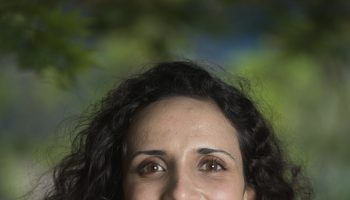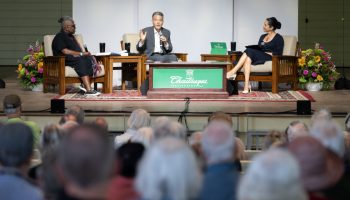Antonella Rescigno
Staff Writer

The message from Javier Corrales was clear — there is no safe democracy.
In the morning lecture at 10:45 a.m. Tuesday in the Amphitheater, Corrales spoke on the Week Six theme, “The Global Rise of Authoritarianism,” and about research that led to his book Autocracy Rising: How Venezuela Transitioned to Authoritarianism.
The Dwight W. Morrow 1895 Professor of Political Science at Amherst College, Corrales focuses on democratization, democratic backsliding and populism in his studies.
“It’s my first time at Chautauqua,” Corrales said. “Sorry I have to talk about a subject that is a bit depressing — at least if you like democracy.”
In the 1990s, he said Venezuela was one of Latin America’s most democratic nations. But over the next two decades, under Presidents Hugo Chávez and Nicolás Maduro, Venezuela made a transition into authoritarianism. He uses Venezuela as an example of this playbook, along with other authoritarian nations such as Türkiye, Hungary, Russia, India and Brazil.
He identified signs of democratic backsliding, such as constitutional changes that concentrate executive power, economic crashes due to exploitation of resources for political gain, abuse of power, and the use of social media as a political weapon.
Chávez’s first focus in office was on obtaining more power, which he did through constitutional changes.
“By creating a new Constitution, … which gave the president a lot of powers, and then immediately governing by decrees — what we would call in the United States ‘executive orders’ — he managed to achieve a significant degree of power in his hands,” Corrales said.
Venezuelans’ reactions to Chávez created a highly polarized country. While some immediately began to protest the decrees, the members of his base supported Chávez’s legislation.
Populism served as a core ideology behind Chávez’s messaging — a message that he was for the poor and against the elites.
“This is the opposite of pluralism,” Corrales said. “In pluralism, you have your critics, and you cannot treat them as enemies of the people. You can’t. A court can decide whether you’re guilty or not, but not the president.”
However, those advocating for people in the lower echelons of society often are quite corrupt themselves, what Corrales called the “paradox of populism,” which exposes itself in how the make-up of the government changes under these regimes.
One of the strategies Chávez used was firing state employees and replacing them with people who agreed with his policies and ideologies.
“They do what’s called occupy or colonize the bureaucracy by first firing a lot of people and then hiring new people and you absolutely transform the bureaucracy into what could easily be another branch of the ruling party,” Corrales said.
This describes how entire institutions in Venezuela like the central bank, oil company and military were brought under presidential control. Public services were turned into an extension of the ruling party.
“Once you have this, in many ways, the game is over. The bureaucracy is huge,” he said. “It’s too big. And it’s too influential in every society, especially modern societies.”
Another signifier of democratic backsliding is having the president serve as the “chief accuser,” said Corrales. One of the ways leaders can do this is through social media.
“Chávez was one of the first political leaders to join Twitter,” Corrales said. “By 2010, he had an account. And by 2012, he already had 3.2 million subscribers in a country with a population of 30 million people and a lot of poor people. So this was a huge account. His opponents didn’t come this close. (He was) one of the first Twitter celebrities in the world.”
Corrales again emphasized the role of populism in fueling these transitions. Chávez mastered the message, “I’m for the people and against the elites.”
“But that’s not pluralism — that’s polarization,” Corrales said.
Corrales described how Chávez built a “cult of personality,” turning his political party into one that “says yes to the president on everything.” Once that happens, everyone that accompanies the president is no longer for the party or the people, they are just there to fulfill the executive’s agenda.
In showing a graph of the changes in the levels of democracy in Venezuela, Corrales superimposed Cuba’s levels to show where the two countries aligned and differed.
“(Cuba’s) always been dictatorial, and Venezuela has come close to matching the Cuban regime,” Corrales said.
Venezuela serves as an example of a democracy that slipped into authoritarianism under Chávez, mirroring the Cuban model. Chávez copied Fidel Castro’s populist government and quickly took over the government entities and made them political.
The authoritarian power was fueled by an oil-driven economic boom. Corrales also highlighted how these economic booms can actually help autocrats take control.
While Chávez confronted the Catholic Church early on, Maduro learned to co-opt religious leaders.
“You give church officials enormous leeway. You might even give them loans and financial advantages. You restore their status, you adopt a socially conservative discourse,” Corrales said. “And many times, these conservative religious leaders will be so grateful for that that they will forgive other trespasses.”
Corrales calls this a “marriage of convenience” between authoritarian regimes and conservative religious groups. This marriage helps regimes normalize their rule in the eyes of the public and avoid criticism from other societal institutions.
“We used to think prosperity protected democracy,” he said. “But in Venezuela, oil money helped the regime co-opt allies and silence.”
Corrales explained that authoritarian regimes often enact some kind of crowd-pleasing policies to maintain public support while dismantling democratic norms. Whether it’s lowering crime, giving economic support or restoring national pride, autocratic governments need these sweeteners to justify power grabs.
Venezuela’s crowd-pleasing grab was that there was a significant amount of social spending. Corrales pointed out other examples like Hungary, which gave Hungarian citizens abroad the right to vote; in Russia, the restoring of past glory; and in El Salvador, lowering the crime rate.
Corrales described how Chávez used social spending to build loyalty among the poor.
“They were able to have a house for the first time,” he said.
But the benefits were just the approval Chávez needed to continue with his authoritarian plan. Without institutions to sustain these benefits, once oil revenues declined, those programs vanished.
“The regime brought them up for a while and then let them fall again,” he said.
The illusion of progress people made was gone.
Corrales said that these regimes at early stages maintain elections, and they don’t fully eliminate democracy — in fact, they maintain a “minimal democracy.”
Now, Venezuela no longer qualifies as even a minimal democracy. In the disputed 2024 election, the opposition reportedly won by a large margin, but the Maduro regime used the tools of autocracy to deny the results.
“Yes. Venezuela today has transitioned to a full-fledged autocracy,” Corrales said. “The mixed system is gone.”
Initially, street protests were commonly visible within the country. The Venezuelan people were loud until masked police and armed civilians overtook the streets. Colectivos, state-backed militias, were a created tactic that the regime sponsored.
“People were protesting both the regime and also the economic crisis,” Corrales said.
But those arresting them were their own people with no name tags, no badges, just masks that covered their faces, which made them unrecognizable. Corrales said that this anonymity shields perpetrators from accountability.
The government was “outsourcing repression,” Corrales said, with militias purposely not wearing uniforms, so people couldn’t blame it on the government.
Colectivos have their own version in each authoritarian regime, and they have been seen in Nicaragua and parts of Africa, too. This is a common characteristic of democratic backsliding.
The resilience of Venezuela’s opposition gives Corrales a sense of hope that the Venezuelan regime will cease one day.
“The most remarkable thing about Venezuela is that the opposition in that country is not dead,” he said. “In so many other countries, the opposition gets decimated and buried for life. But there is an opposition heart beating.”
Corrales emphasized that democratic systems can fade gradually without citizens realizing the shift.
This slow decline is part of what makes democratic backsliding so dangerous. The appearance of elections, courts and civil society remains, but their independence and power are hollowed out.
Corrales called this transformation “executive aggrandizement.”
“The government begins to fund organizations that seem to be independent, but in reality, they’re doing the work of the president,” he said.
When it comes to which countries, such as the United States, can avoid democratic backsliding, Corrales’ message was grim.
“My colleagues in this field will say there is no safe democracy. We used to think that democracies after a certain age and certain levels of wealth and certain norms enduring over time were safe, and they’re still safe in that we don’t see rapid transitions to nasty authoritarianism,” he said. “But no democracy is completely safe from backsliding.”
While Corrales noted that he isn’t well-versed in prescription, he had a clear message about what people could do to avoid authoritarianism.
“Let me repeat it again,” said Corrales. “Elections, elections, elections.”




